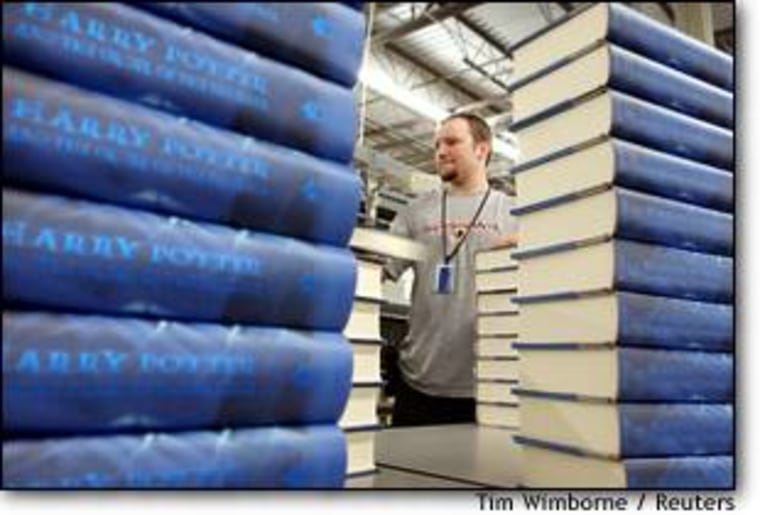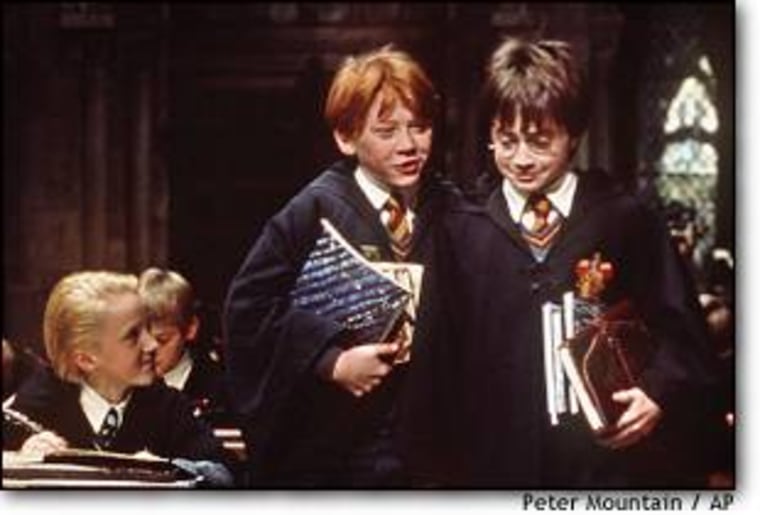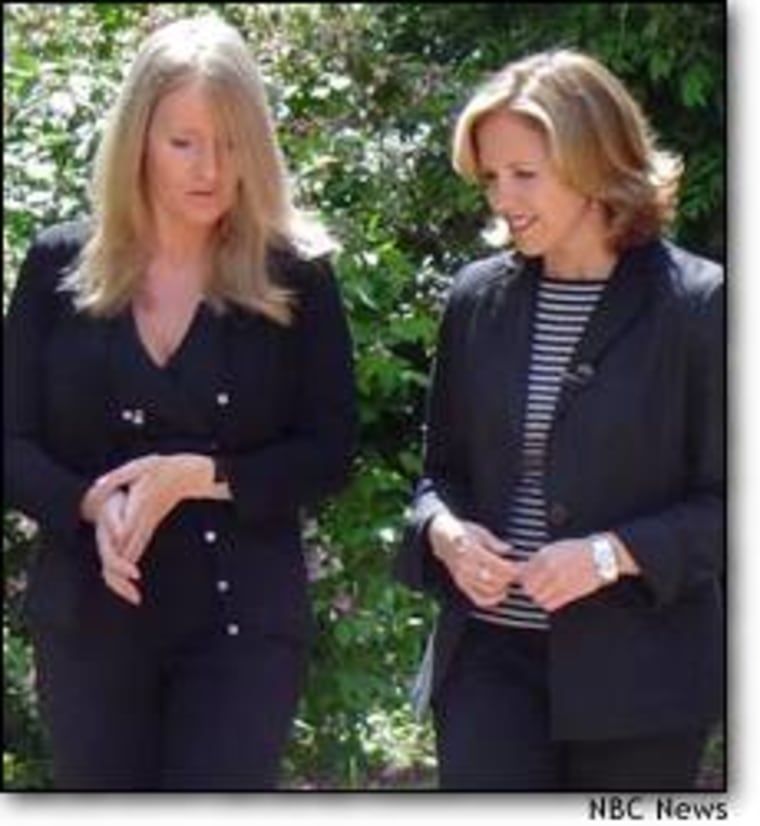The battlements may look like Hogwarts School of Witchcraft and Wizardry, but it’s really ancient Edinburgh Castle. Scotland is home to J.K. Rowling, author of the story that has won the world over: Harry Potter. Her books about the boy wizard have sold more than 200 million copies and made Rowling richer than the Queen of England. As “Harry Potter and the Order of the Phoenix” goes on sale, many booksellers are hoping the fifth tale in the series flies out faster than a Nimbus 2000. Fans have waited three long years since the last installment. Why so long? In an exclusive interview with NBC’s Katie Couric, Rowling dispels some myths and spills some secrets about her magical, mysterious world.
It's the most eagerly anticipated children’s book of all time, and midnight, June 21 is the witching hour. “Harry Potter and the Order of the Phoenix” continues the saga of the boy wizard with the lightning bolt scar — and readers of all ages have been dying to know what happens next.
All the publishers will say is “deeper secrets, darker powers, stronger magic.” So we decided to go straight to the source — the author who’s cast this spell over us mere muggles: J.K. Rowling. As titillating as that one line from the new book was, I was counting on a little more 411. Clearly, I felt it was my mission to get Rowling to start spilling her Bertie Botts Beans.
Katie Couric: “Can you tell me a little bit about this book, or will you have to kill me?”
Rowling: ”[laughter] I will have to kill you. But, you know, if you’re prepared to take that risk.”
She does give us some clues later on, but there’s good reason why Rowling so closely guards her chamber of secrets. In the last few months, fake chapters have shown up on the Internet and a British printing company employee was caught trying to sell stolen book pages. Keeping the secrets is crucial to the multi-million dollar marketing campaign. So there was concern the cauldron could be leaky. But of course, being a skilled journalist, I was able to craft my questions so carefully, she had no choice but to blab.
Couric: “Can you just tell me basically what happens to Harry in this book? That’s a specific question.”
Rowling: “Yeah, that was very scalpel-sharp. He has a really hard time in this book, I would say.”
Couric: “Is he going through puberty?”
Rowling: “Yes he is. He’s angrier.”
Couric: “Does he have zits?”

Rowling: “No he doesn’t. I see Harry as someone who has great skin. That’s the one thing he’s got going for him, thank God. I mean, spots on top of everything else would be too horrible for him. And yes, he does have certain adolescent rights of passage happen to him.”
Couric: “Any snogging with Hermione?”
Rowling: “Harry and Hermione! Do you think so?”
Couric: “No I’m kidding. We should probably explain that snogging means kissing.”
Rowling: “Yeah.”
Couric: “Lest people think they were shagging!”
Rowling: “Lest people think you’re talking about something completely inappropriate.”
The story of how Jo Rowling brought Harry Potter to life has become legend itself. She’d walk her daughter Jessica in her stroller down the street until she fell asleep, then rush to Nicolson’s Cafe to write while the baby napped. Back then, she was a single mum living on welfare. Five years and five books later, she’s remarried, has a new baby boy, and her fortune’s worth an estimated $500 million. Oh, and Nicholson’s Cafe is now a Chinese Restaurant.
Rowling: “It is true. I really was that broke and I know what it feels like to be that broke and to live through it and not to know it’s about to change. That’s the crucial thing. I couldn’t see any light at the end of the tunnel, and every day I’m grateful that we’ve got food in the fridge now and that I don’t have to worry about the bills and that I know I can afford Jessie’s clothes and it’s… yes, I’m grateful for that every day.”
Couric: “Is there anything you miss now that you are so well known Jo and so wealthy and such a celebrity?”
Rowling: “Yeah I miss the anonymity. Completely miss it.”
In Europe, she’s more recognizable than she is in the United States, and there are times when Rowling wishes she could fashion one of those invisibility cloaks.
Couric: “What kinds of things do they say to you, like if you’re out at the market or taking a walk.”
Rowling: “Normally, they start with, ‘It is you isn’t it?’ I think I don’t look that distinctive, so very often if you’re at the supermarket you’ll start off near the apples and then you see someone’s kind of thinking, ‘hmmm might be her’ and then you’re halfway along and you’re by the yogurts and they’re thinking, ‘Yeah it is her,’ and they’ve got a kid with her and the kids going, ‘It is mum, it is mum, it is her.’ And then you get to the toilet roll always and you’re just reaching out for your favorite brand and then they come up to you, always.”
Couric: “When you’re getting Tampax have you had that?”
Rowling: “Always. Yes that did happen the other day. I was standing there with this box in my hand — yes of course I’ll sign autographs. May I put this down first?”
Couric: “Better than Kaopectate or something like that.”
Rowling: “Slightly.”
Still, the 37-year-old author says Scotland does afford her more anonymity than her native England. She moved here in 1994, after her first marriage to a Portuguese journalist fell apart.
Couric: “Do you ever hear from your first husband? I bet he’s going, ‘What was I thinking?’”
Rowling: “Yeah, a really big no comment on that one.”
Her second marriage in 2001 to a Scottish doctor named Neil Murray (who looks like a grown up you-know-who), was followed this past March by the birth of their first child, David.
Couric: “Does he have glasses and a little scar on his forehead?”
Rowling: “Well you see that’s why we called him David, because we had to find a name that didn’t rhyme with Harry, I hadn’t used in the books, had absolutely no mythological or magical connection, didn’t mean ‘he who must not be named’ in Hebrew, you know.”
Meanwhile, Rowling’s money keeps rolling in. The first four Harry Potter novels continue to fly off the shelves in 200 countries, in 55 different languages. And the phenomenon’s leapt off the pages and onto the silver screen. The first two “Harry Potter” feature films have grossed a combined $1.8 billion worldwide. But after writing four mega-selling books in a lightning-fast five years, some wondered if the long wait for book number five meant Rowling was losing her magic touch.
Couric: “Endless rumors and speculation about this book.”
Rowling: “About why?”
Couric: “It took three years to write. People said you had writer’s block, that you weren’t interested in Harry anymore, that you were distracted by your family and your wealth.”
Rowling: “Yeah, yeah.”
Couric: “So settle it once and for all, what did take so long?”
Rowling: “Well just the writing of it, it’s a long book, and that’s just how long it took to write. And I said to my publishers, I didn’t want a deadline this time because I knew I just needed to take some time. So it’s not true that I had writer’s block and as far as, you know, being distracted by other stuff, I mean I think I really would have been distracted before now. You know, I’ve been writing Harry through something like three changes of country, a marriage, a divorce, you know, birth of a daughter, unemployment, employment. I mean, I don’t think getting some money is going to knock me off track now.”
“Harry Potter and the Order of the Phoenix” rises from the ashes at a whopping 896 pages. But even before its release, book five has been worth its weight in Gringotts’ gold, setting records for the largest pre-ordered book in history.
Rowling: “There is a lot in this book. I can only say that I’ve had to lay certain clues in book five. Some clues are resolved, some things are resolved in book five and there’s information in there that you really do need to know otherwise people will feel cheated when certain outcomes happen.”

Couric: “You said when the last book came out that the death of one character was ‘the beginning of the deaths.’ Yikes!”
Rowling: “Yeah, that’s nice, isn’t it. There’s going to be a blood bath [laughter].”
Couric: “Warm and fuzzy.What does that mean?”
Rowling: “It’s a war. Essentially a war has broken out again and when I say the beginning of the deaths, I mean the deaths that are meaningful, I suppose, to the reader. In this book, what I consider to be a major character dies. It was awful to write. It was absolutely awful. And I was literally, well I did, I cried after doing it, and walked into the kitchen afterwards in tears. And Neil said to me, ‘What’s the matter?’ And I said, ‘Well I’ve just killed the person that I’m going to kill.’ He doesn’t know who it is. And Neil said, ‘Well, don’t do it then.’ Which showed he completely didn’t understand that you need to be very unpleasant and vicious to your characters to write heart-warming children’s books. He’s a doctor, he just doesn’t get it. He’s more into saving people than killing them.”
But Rowling’s ruthlessness has come under fire. Some parents have criticized her for over-emphasizing dark themes such as death. And some religious groups have gone as far as saying the novels are potentially harmful and promote occultism.
Rowling: “I think that’s utter garbage. I absolutely do not believe in the occult, practice the occult. I’ve never… I’ve met literally thousands of children now. Not one of them has said to me you’ve really turned me on to the occult, not one of them. Now I’m convinced that if that’s what my books were doing, I would by now have met one child who would have come up to me, covered in pentagrams and said, ‘Can we go and sacrifice a goat later together, will you do that with me?’ It’s never happened, funnily enough.”
Couric: “You find it very annoying, I can tell.”
Rowling: “Well occasionally I do, just occasionally I do. Because I am being accused of something quite horrible. So of course I’ve got to defend myself.”
Couric: “What do you believe in? I’m just curious about your belief system — God, heaven?”
Rowling: “Oh, I do believe in God.”
Couric: “You do?”
Rowling: “Yeah, which I’ve said before, but that just seems to annoy them even more For some reason. I don’t think they want me on their side at all.”
Rowling also dispelled the rumor there would be more than the seven Harry Potter books she’s promised. And true to form, she says she won’t accept a deadline for writing the last two. But one thing’s for sure — now that the word “muggle” has been added to the Oxford Dictionary, Rowling’s assured of literary immortality.
Couric: “That gives you a feeling about a) what kind of impact you’ve had, and b) how enduring people think these books will be, because as far as I know, they don’t take a lot of words out of the dictionary.”
Rowling: “That would be so embarrassing, wouldn’t it? It’s like being melted down at Madam Tussauds. I always thing that’s the ultimate humiliation. That’s why I wouldn’t really want to be in Madame Tussaud’s, because the day comes when they melt you down to make you into someone else.”
Couric: “It does? Oh God, I’m in there.”
Rowling: “Well, some people they keep.”
The third Harry Potter movie, “The Prisoner of Azkaban,” just finished filming in Scotland, for release in 2004.
